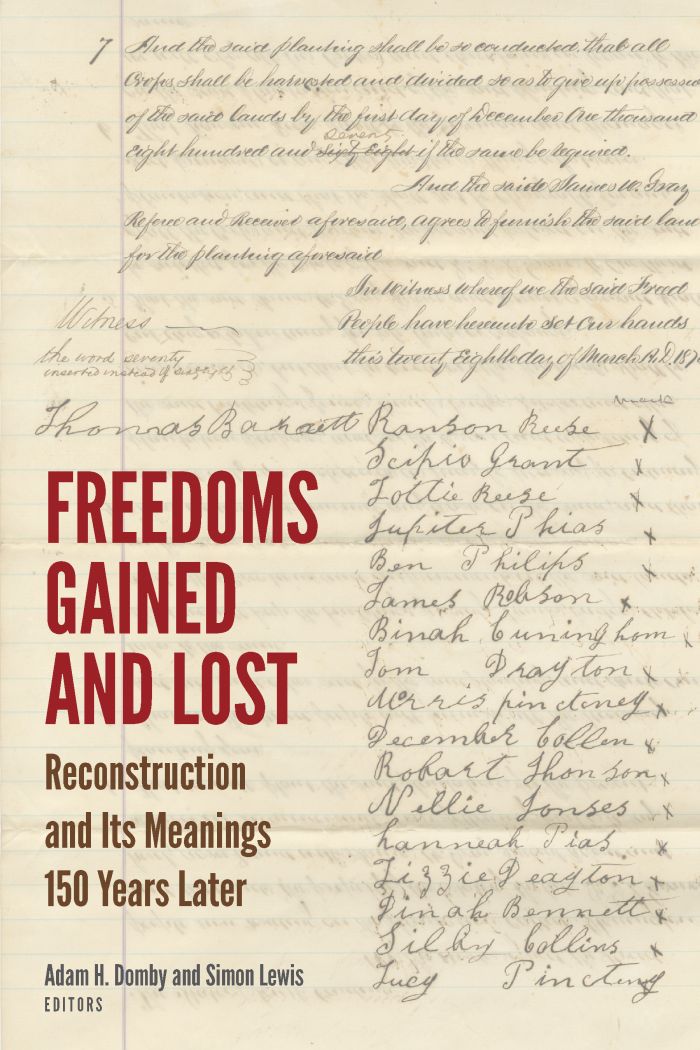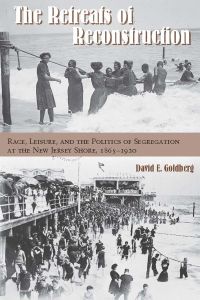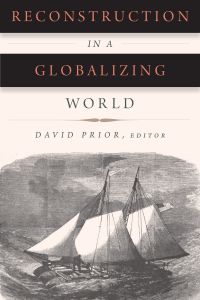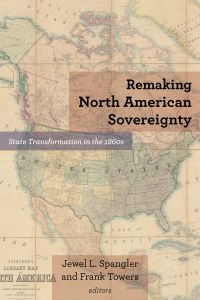Freedoms Gained and Lost
Reconstruction and Its Meanings 150 Years Later

This book can be opened with

Freedoms Gained and Lost is a splendid and timely collection of thought-provoking essays on a wide range of issues surrounding Reconstruction in America. These well-written and thoroughly researched essays exemplify the latest advances in the scholarship of Reconstruction and together make a profound contribution to the field.—Aaron Astor, author of Rebels on the Border: Civil War, Emancipation, and the Reconstruction of Kentucky and Missouri, 1860-1872.
. . . Freedoms Gained and Lost provides a valuable synthesis of the current state of Reconstruction studies. Written with our current moment in mind, the collection will serve as a useful tool for graduate students, journalists, and general readers interested in learning more about Reconstruction and its legacies. As we continue to struggle with our own “Third Reconstruction” moment, such a public-facing effort should be applauded.—Journal of the Civil War Era
The articles in this collection illustrate how a wide range of different methodological approaches and theoretical frameworks can generate many essential insights into the complex history of Reconstruction. . . these essays offer a vital and engaging contribution to this ongoing work.—Journal of Southern History
. . . [C]ontributing authors explore the nature of conservatism, the politics of public memory, and the value and permanence of digital resource platforms. The result is a very good book, the type that should bewelcomed by any baccalaureate or graduate programs in history. Highly recommended.—Choice Reviews
. . . Freedoms Gained and Lost provides a valuable synthesis of the current state of Reconstruction studies. Written with our current moment in mind, the collection will serve as a useful tool for graduate students, journalists, and general readers interested in learning more about Reconstruction and its legacies. As we continue to struggle with our own “Third Reconstruction” moment, such a public-facing effort should be applauded.—Journal of the Civil War Era
Adam Domby is an Associate Professor of History at Auburn University, having previously worked at the College of Charleston. He is the author of The False Cause: Fraud, Fabrication, and White Supremacy in Confederate Memory. In 2018, he won the John T. Hubble Prize for the best article in Civil War History. He received his PhD from the University of North Carolina at Chapel Hill.
Simon Lewis (Edited By)
Simon Lewis has been teaching African and Third World Literature at the College of Charleston since 1996. A former long-time director of the Carolina Lowcountry and Atlantic World (CLAW) program at the College, Dr. Lewis is the coeditor of three volumes of essays in USC Press’s Carolina Lowcountry and Atlantic World series: The Fruits of Exile: Central European Intellectual Immigration to America in the Age of Fascism, Ambiguous Anniversary: The Bicentennial of the International Slave Trade Bans, and The Civil War as Global Conflict: Transnational Meanings of the American Civil War. He is also the author of two monographs on African literature and numerous refereed articles primarily on South African writers. He was recognized in 2021 with a Governor’s Award in the Humanities from South Carolina.
Introduction
Simon Lewis and Adam H. Domby | 1
Whom Is Reconstruction For?
Bruce E. Baker | 17
Implementing Public Schools: Competing Visions and Crises in Postemancipation Mobile, Alabama
Hilary N. Green | 39
Reconstruction Justice: African American Police Officers in Charleston and New Orleans
Samuel Watts | 57
1874: Self-Defense and Racial Empowerment in the Alabama Black Belt
Michael W. Fitzgerald | 78
“They Mustered a Whole Company of Kuklux as Militia”:
State Violence and Black Freedoms in Kentucky’s Readjustment
Shannon M. Smith | 96
A Woman of “Weak Mind”: Gender, Race, and Mental Competency in the Reconstruction Era
Felicity Turner | 121
Idealism versus Material Realities: Economic Woes for Northern African American Families
Holly A. Pinheiro, Jr. | 143
“Works Meet for Repentance”: Congressional Amnesty and Reconstructed Rebels
Brian K. Fennessy | 159
Toward an International History of Reconstruction
Don H. Doyle | 181
The Dream of a Rural Democracy:
US Reconstruction and Abolitionist Propaganda in Rio de Janeiro, 1880–1890
Sergio Pinto-Handler | 212
Lessons from “Redemption”: Memories of Reconstruction Violence in Colonial Policy
Adam H. Domby | 232
Remembering War, Constructing Race Pride, Promoting Uplift:
Joseph T. Wilson and the Black Politics of Reconstruction and Retreat
Matthew E. Stanley | 249
Fact, Fancy, and Nat Fuller’s Feast in 1865 and 2015
Ethan J. Kytle | 276
Acknowledgments | 305
List of Contributors | 307
Index | 309




